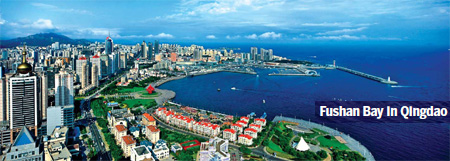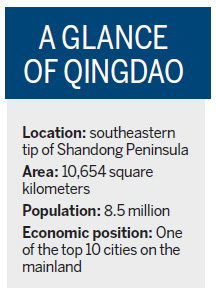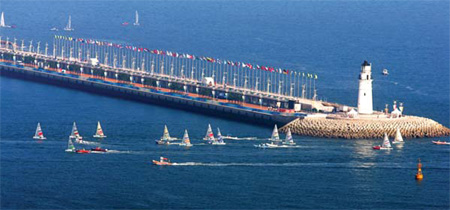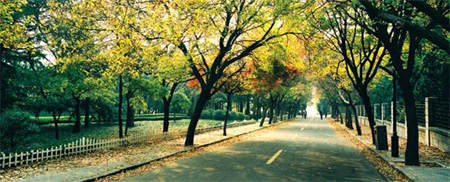Basking in the glow of its 120 years

|
A glimpse of QIngdao International Sailing Center. |
|
No 1 swimming resort in Qingdao Photos Provided to China Daily |
Qingdao is full of vitality, romance and the spirit of innovation
It has beautiful vistas, a laid-back atmosphere, and a robust business life, and this vibrant Shandong port city is well on its way to becoming an ultra-modern international metropolis.
Qingdao is a core part of Shandong province's blue economic development zone and a leader in the emerging maritime economic sector.
Earlier this year, the State Council approved the peninsula's Blue Economic Zone Development Plan, a unique State-sponsored, ocean-economy-oriented strategy that is a part of the provincial 12th Five-Year Plan (2011-2015).
But, this dynamic, picturesque city has long been known for its seascape, sailing facilities, and for being the home of Tsingtao Beer, and more recently the white goods giants Haier and Hisense electronics.
This year is its 120th anniversary and, it wants to build on its local characteristics to open a new chapter, with a global vision to become a city that meets international standards - a livable city with happy residents.
Strong innovation
Qingdao has always been a leader in innovative development and the first to try out new technologies, for example in the field of telecommunications, with a network that combined cable TV and the Internet.
The city is especially proud of its ocean science and technology resources. It has 28 ocean-science research and education institutes with 1,700 senior specialists. It also has 70 percent of the country's total number of academics specializing in maritime development.
About 30 percent of China's marine research institutes are in Qingdao, including Ocean University of China and the Chinese Academy of Sciences' Marine Studies Institute. These organizations are home to 40 percent of China's top ocean science researchers and scholars.
Part of its innovative ability comes from local enterprises, five of which have national-level laboratories.
The city is moving forward to add more innovative capacity in science and technology, and is increasing its pool of innovative, talented people.
By strengthening its innovative ability, the city will be able to improve its industrial structure and development and promote economic, societal, and cultural prosperity.
Culture
The city is known for its history and has many cultural resources, such as Qi Dynasty (550-577) relics, and Taoist relics in the Laoshan Mountains. It is a home of Confucianism and Taoism.
In recent years, it has become a center of diverse cultures, which are enriching the local culture and helping create an "inclusive, harmonious" city.
Qingdao has seen rapid growth in new cultural projects and the culture industry has worked hard to become more competitive and increase its influence in the surrounding area.
The city feels that it needs to meet the spiritual and cultural needs of its people, and this means making culture part and parcel of its economy, politics, and society.
The integration of culture in its daily will help change the mindset of the local peoples. Cultural building blocks are an important part of a more sustainable, equitable society, one that could become a model for the rest of the country.
Harmonious area
Qingdao was one of the earliest cities to be recognized as a "National Civilized City", and was later given the "City with most satisfied citizens" and "Safest city" titles. This is largely thanks to local government's ethos of putting livelihoods first.
In its quest to become a harmonious society, Qingdao needs to apply scientific development with socialist characteristics to bring prosperity to its people. It also needs to develop a society with a small carbon footprint and people who use technology to create good economic, political and cultural values.
The idea is also to strike a balance between the urban and the rural and to develop in a way that encompasses every district of the city.
A harmonious Qingdao will help protect the interests of its people, increase creativity, and improve the social justice system and help maintain peace and order.
Uniquely open
Qingdao was one of the first of 14 cities to benefit from the central government's opening up and reform policies.
It has relations with 17 countries and regions, and more than 2,000 foreign business associations and enterprises have offices here.
Liuting International Airport handles many domestic and 12 international airlines, with connections to Tokyo, Seoul, Paris, Hong Kong and Taiwan. It handled 11.1 million passengers last year and 164,000 tons of cargo.
As far back as the early 1890s, Qingdao was one of the most important trading centers in China. It now has the country's largest cargo container berth and does business with about 150 countries and regions.
Last year, it handled 350million tons of cargo and 12 million containers, putting it among the top 10 ports in the world.
It also has a State-level economic and technological development zone, a high-tech development zone, and a bonded zone, which have preferential policies to attract foreign investors. And many of world's top 500 corporations are working here, and it has $36 billion worth of direct foreign investment.
As a sailing capital, Qingdao hosted the sailing events of the 2008 Olympics and Paralympics, and has some of the world's top water sports facilities.
In the past two years, it has hosted many international sailing competitions, such as the Volvo Ocean Race, the Clipper Round the World Race, and the Extreme Sailing Series.
Living
Qingdao has one of China's most spectacular environments, with four clearly defined seasons, beautiful weather, and excellent air quality, so it is regarded as one of China's best tourist destinations.
The city has been praised for being a "national environmental protection city", "national sanitary city", and "national garden city". It has also received the "National residential environment", "Most desirable city", "Most exotic city", and "Happiest city" prizes.
It has been a popular tourist destination and health resort since as far back as the 1920s. Its beaches, century-old European-style buildings, and Laoshan Mountain, which overlooks the sea, are some of the most popular attractions.
Last year, it received 45 million visitors, 1 million of them from overseas. Tourism-related revenues amounted to 58 billion yuan ($8.9 billion), or more than 10 percent of its GDP.
A more livable Qingdao has to be people-oriented so much of its effort has gone into improving people's livelihood and happiness. The corner stone of this is improving civic construction, making management more humane, and perfecting the living environment to make life more convenient.

The city also needs to create more job opportunities to attract the most talented people from across the country, to get them to come to look for business opportunities in the travel, education, medical care, entertainment and culture sectors.
Making Qingdao the most harmonious city in China is the ultimate goal, creating an atmosphere where its people have a sense of pride in it as a city that makes them happier and more contented with their lives.
Blueprint
Over the next five years, the government wants to turn the city into a leading "blue economic" development center, with the focus on maritime industries.
It is a major part of Shandong Peninsula's blue economic zone will take the lead in establishing a modern ocean industrial system and increasing scientific and technological innovation.
Qingdao is trying to improve its fishing industry, marine engineering and marine equipment manufacturing and related chemical industries. And new energy and ocean ecology are seen as emerging sectors of the economy.
It will strengthen its ocean engineering equipment industry and marine manufacturing and it has its focus on new areas such as marine services, which includes port logistics, seaside tourism, and strategic emerging industries.
By 2015, Qingdao will be a leader in the nation's blue economic scientific development, and a major part of the blue economic zone, with independent research and development and a demonstration area for ocean ecological protection.
Even with its 120-year history, Qingdao is still full of vitality, romance and the spirit of innovation and a Friendly, Beautiful Qingdao is always here to welcome visitors.
|
Autumn scenery of the Eight Great Passes in Qingdao |

(China Daily 06/01/2011 page51)

















